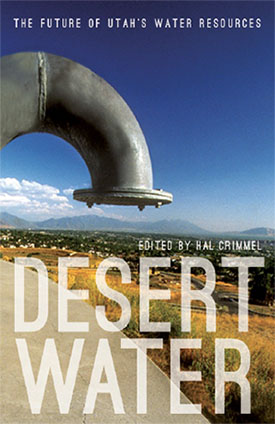Film Screenings at WSU to Feature Utah’s Water Future
 OGDEN, Utah – Utahans experienced the warmest, most arid winter on record in 2014-15. In light of the dry conditions, the public is invited to screen two short films based on a recently published collection of essays “Desert Water: The Future of Utah’s Water Resources,” Oct. 19 at 7 p.m. in the Weber State University Shepherd Union Wildcat Theater.
OGDEN, Utah – Utahans experienced the warmest, most arid winter on record in 2014-15. In light of the dry conditions, the public is invited to screen two short films based on a recently published collection of essays “Desert Water: The Future of Utah’s Water Resources,” Oct. 19 at 7 p.m. in the Weber State University Shepherd Union Wildcat Theater.
Author Hal Crimmel, chair of WSU’s English department and award-winning documentary filmmaker and WSU alumnus Isaac Goeckeritz will present “Desert Water: A New Water Ethic” and “Desert Water: Climate Change and the Future of the Great Salt Lake,” both based on Crimmel’s publication of edited essays.
The film screenings and subsequent discussion are part of the Weber Historical Society Fall 2015 Lecture Series.
Crimmel always has been passionate about the environment. With a background in environmental literature, he came to WSU in 2001 after living in several other states. As a stranger to Utah, he quickly noted local attitudes in regards to water resources differed significantly from those of other states.
“A few years ago, there were many news story about what seemed short-sighted schemes to use Utah’s water, ranging from a nuclear power plant on the banks of the Green River, to a pipeline to pump water from Flaming Gorge Reservoir to the cities of Colorado’s Front Range,” Crimmel said. “These are just a few of the issues that concerned me. I wanted to learn more about these and call them to the public’s attention in a book.”
“Desert Water,” is a peer-reviewed collection of essays, with topics ranging from history, to law to public policy, written by professors from WSU, Utah State University, University of Utah, Brigham Young University, University of Northern Arizona, along with contributions from local writers and members of the community.
In 2014, Goeckeritz, produced a film about Utah’s air quality for PBS affiliate KUED called “The Air We Breathe.” After seeing the film, Crimmel approached Goeckeritz with a collaborative idea of creating two short films.
Crimmel is a Brady Distinguished Professor of English and founding co-chair of WSU’s Environmental Issues Committee. He teaches courses in environmental humanities, American literature, and writing. His other notable publications include: “Teaching About Place: Learning from the Land” (2008), “Dinosaur: Four Seasons on the Green and Yampa Rivers” (2007) and “Teaching in the Field: Working with Students in the Outdoor Classroom” (2001).
Goeckeritz produces documentary films and other video projects for business, non-profit and educational institutions. He graduated from WSU with a degree in geography. Goeckeritz has created several films about Utah issues and history such as: “God in Utah,” “Salt Lake City: A Downtown Story” and “Ogden: Junction City of the West.”
Those who attend the Weber Historical Society event can anticipate Goeckeritz’s beautiful cinematography paralleled with a balanced look at Utah’s pressing water issues. “Water is all around us, and we need to consider how a new water ethic applies to our water usage,” he said.
Crimmel hopes audience members leave understanding climate change will impact the Great Salt Lake, and adjustments are needed to guarantee lake levels remain adequate. Crimmel said the state will not run out of water like some hypothesize, but Utahans need to change their attitudes to value and manage water resources.
“Simply put, water is essential to human life. It provides the foundation for our environment and economy,” Crimmel said. “Without wise use of water, both our livelihoods and quality of life are negatively impacted.”
The next lecture in the series will be "The Man Who Never Died: The Life and Legacy of Joe Hill after a Century," featuring journalist and author William Adler.
The event is presented by the WSU Alumni Association, College of Social & Behavioral Sciences, Department of History, Stewart Library and Weber Historical Society. For more information, visit weber.edu/History/weberhistoricalsociety.html
Visit weber.edu/wsutoday for more news about Weber State University.
Jennifer Solvieg Perry, College of Social & Behavioral Sciences
801-626-7948 • jenniferperry1@weber.edu- Contact:
Eric Swedin, history professor
801-395-3553 • eswedin@weber.eduHal Crimmel, English chair
801-626-8044 • hcrimmel@weber.edu
